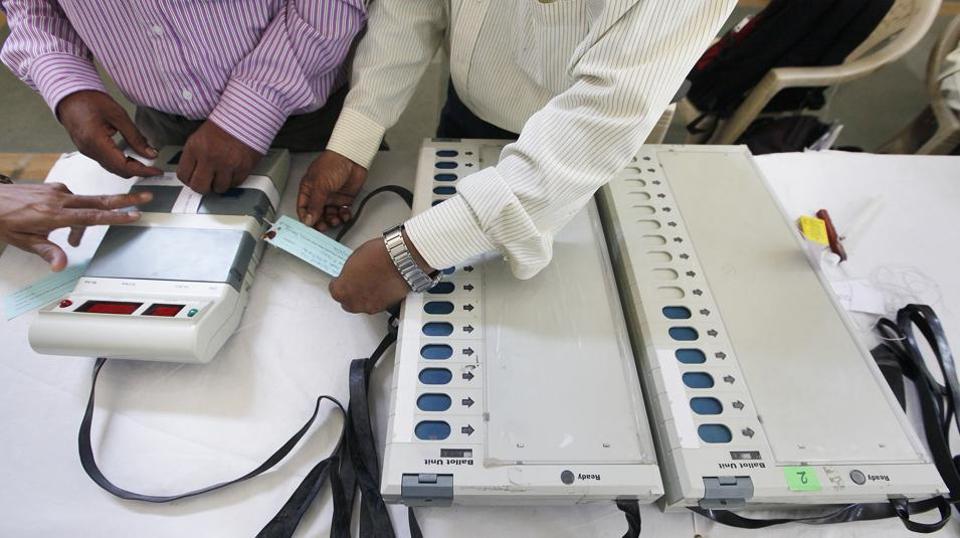


Congress leaders have raised concerns about EVM tampering in Haryana, citing results from machines with varying battery strength. However, sources from the Election Commission have rejected these claims, stating that alkaline batteries used in EVMs have the property of regaining voltage when switched off, which explains the discrepancies in battery percentages. The EC further clarified that initial battery strength is determined on the day of commissioning in the presence of candidates, and the control unit remains functional as long as the battery has more than 5.8 volts, similar to a vehicle running on reserve fuel.
Electronic Voting Machines: Concerns and Clarifications
Background
Electronic Voting Machines (EVMs) have been used in India since 2000 to facilitate free and fair elections. They are designed to improve efficiency, reduce fraud, and enhance voter confidence. However, the use of EVMs has also sparked controversies regarding their reliability and susceptibility to tampering.
Current Concerns
In recent elections held in Haryana, Congress leaders expressed concerns about possible EVM tampering. They cited reports of discrepancies in battery strength among EVMs, suggesting that some machines may have been tampered with.
Election Commission's Response
The Election Commission (EC) has dismissed these claims, stating that the alkaline batteries used in EVMs have a unique property. When switched off, these batteries regain voltage, which explains the variations in battery percentages observed. The EC further clarified that:
Top 5 FAQs and Answers
1. Can EVMs be tampered with?
According to the EC, EVMs are tamper-proof and have multiple layers of security features. However, some concerns have been raised regarding the possibility of tampering with the software or firmware of the machines.
2. How are EVMs tested for accuracy?
EVMs undergo rigorous testing and certification processes before being deployed for elections. This includes mock polls, paper ballot trails, and random selection of machines for verification.
3. What are the advantages of EVMs?
EVMs reduce election time, eliminate manual errors, and provide quick counting of votes. They also improve voter convenience and have a deterring effect on booth capturing.
4. What are the concerns with EVMs?
Concerns have been raised about the lack of paper trails, the possibility of software vulnerabilities, and the potential for human error in handling the machines.
5. What measures are taken to ensure the integrity of EVMs?
The EC employs various measures to ensure the integrity of EVMs, including sealing of machines, security protocols, and independent verification of results. The machines are stored under tight security and access is restricted to authorized personnel only.
Conclusion
The issue of EVM reliability remains a topic of debate. While the EC maintains that EVMs are secure and tamper-proof, concerns about their vulnerability continue to persist. It is crucial for the EC to address these concerns transparently and take all necessary steps to enhance voter confidence in the electoral process.

After issuing directions earlier this year to expedite the disposal of execution petitions, the Supreme Court has expressed disappointment over the fact that more than 8.8 lakh such petitions are still pending across the country. Despite disposing of 3.38 lakh petitions since March, the Court notes that the backlog is still concerning. It warns that delay in executing decrees could result in travesty of justice and directs the Karnataka High Court to provide an explanation for not submitting data on pending cases.

With election results just around the corner, the Union Home Minister has reiterated the BJP's respect for its alliance partners. The decision on forming a government in light of the election outcome will be based on the results and mutually agreed upon by all parties involved. Stay updated with News24 for the latest developments in the political sphere.

In a surprise move, President Donald Trump has commuted the sentence of former U.S. Representative George Santos, who was serving a seven-year prison term for fraud and identity theft. Santos, a New York Republican, admitted to deceiving donors and stealing the identities of 11 people, including family members, to fund his campaign. The decision was announced by Trump on social media, spurring strong reactions from both supporters and critics.

In a significant development, Defence Minister Rajnath Singh inaugurated Hindustan Aeronautics Limited's third production line for the LCA Tejas Mk1A and also witnessed the aircraft's successful maiden flight in Nashik. The event also marked the inauguration of HAL's second production line for the Hindustan Turbo Trainer-40 (HTT-40). With the approval of the purchase of 97 LCA Mark 1A fighter jets, the need for new inductions has been underlined by IAF chief AP Singh, while HAL officials remain confident in meeting this requirement.

In a significant development, over 200 Maoist rebels, including top leaders Rupesh and Ranita, have surrendered to Indian security forces in the Bastar region of Chhattisgarh. This marks a critical moment in the long-standing fight against Naxalism in the country. The region of Abujhmarh and North Bastar, known for its dense forests and difficult terrain, has historically served as a safe haven for Maoist groups, making it challenging for authorities to root out their presence. The massive surrender of Maoists is not only a tactical win but also a symbolic victory in the government's efforts to rid the "Red Corridor" of Naxalite influence.

Amidst his busy schedule, Congress leader Rahul Gandhi is set to make a heartfelt tribute to Zubeen Garg, the beloved singer of Assam, by attending his last rites at 'Zubeen Kshetra' in Sonapur. In anticipation of his arrival, strict security measures have been implemented in the area since morning, with a thorough inspection conducted by Gaurav Gogoi. With the deployment of police, paramilitary forces, and CCTV cameras, all eyes will be on the site to ensure a peaceful and incident-free event.

The Supreme Court has agreed to hear Tamil Nadu Deputy Chief Minister Udhayanidhi Stalin's plea in 2026 to combine and transfer all FIRs and complaints related to his comments on "eradicate Sanatan Dharma" made in 2023. Stalin's lawyer, Mukul Rohatgi, argued that multiple FIRs and complaints had been filed against his client and requested for the matter to be posted in 2026. The top court had previously ordered no new FIRs to be registered against Stalin without its permission, stating that multiple complaints on a single issue were not valid.

President Droupadi Murmu has announced the launch of the Adi Karmayogi Abhiyan, aimed at promoting self-reliance and self-sufficiency in every tribal village. The initiative, organized by the Ministry of Tribal Affairs, is a step towards ensuring that tribal communities are included in the development journey of the nation. The National Conclave on the Adi Karmayogi Abhiyan, held in New Delhi, saw the participation of top government officials and tribal representatives from across the country. The focus of the conclave was on "Tribal Village Vision 2030" and how to implement it for the benefit of tribal communities.

Former Trump administration national security adviser John Bolton has been charged with illegally retaining and sharing classified documents from his time in government. The indictment alleges that Bolton shared more than 1,000 pages of information with relatives through a personal email account, which was hacked by an entity believed to be affiliated with Iran. The case raises questions about the use of the Department of Justice to target political opponents.

US President Donald Trump announced his plans to meet with Russian President Vladimir Putin in Hungary to discuss and potentially end the ongoing war between Russia and Ukraine. Before their meeting, US officials will convene with representatives from Russia to attempt to reach a resolution. This comes after a phone conversation between the two leaders, in which Putin also congratulated Trump on achieving peace in the Middle East. Trump believes this success could have a positive impact on negotiations to end the Russia-Ukraine war.